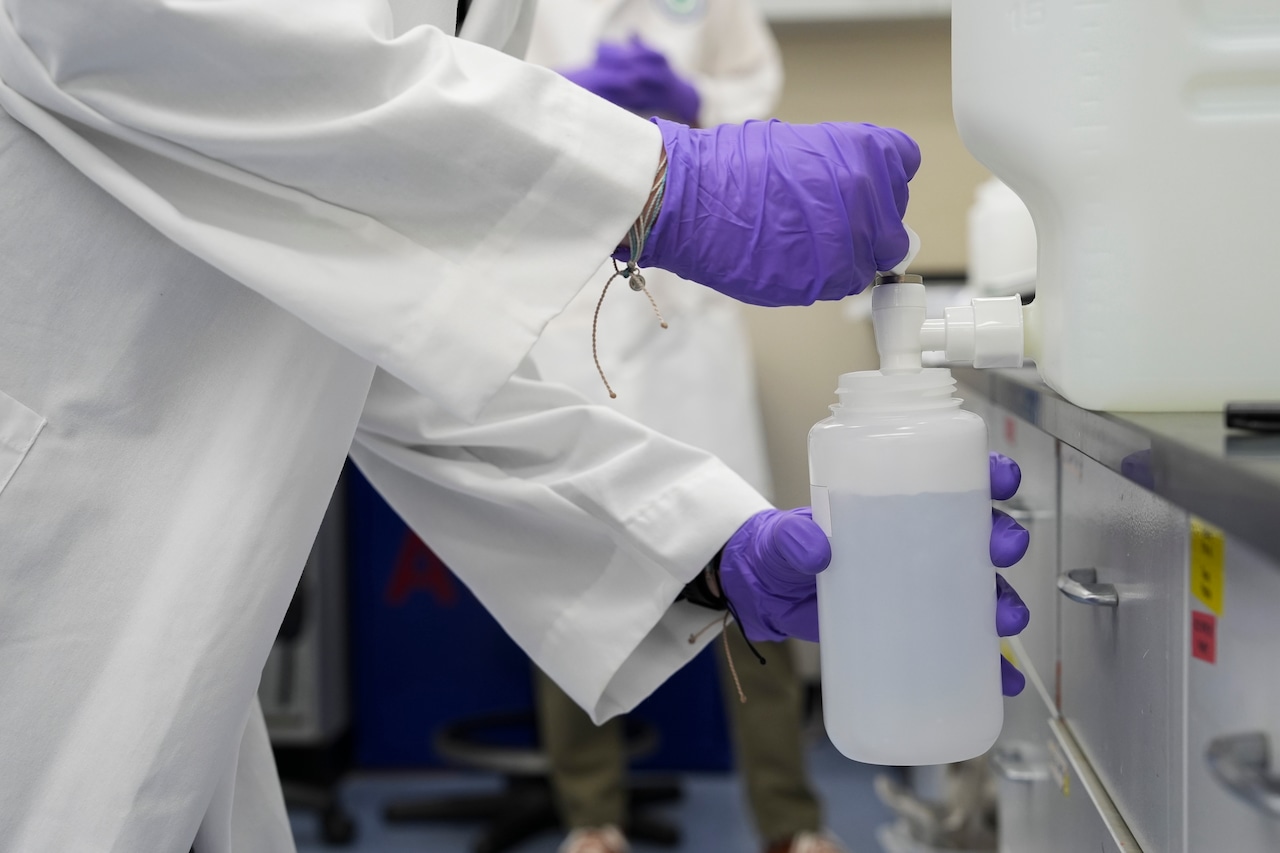The letter is grim. It warns that Trenton’s water utility does not possess the technical, managerial or financial capacity to avert a possible “catastrophic failure,” of its water system.
New Jersey Department of Environmental Protection, DEP, Commissioner Shawn LaTourette signed it on July 29, 2025. He’d made an unannounced visit to the utility’s water treatment plant on June 18 and was not impressed.
“The observations made during this three-hour site visit were deeply troubling and conformed with the independent findings of historic neglect, underinvestment, and an unsupported and ill-equipped TWW workforce,” he wrote.
The letter then urged the city to consider a regional water authority for Trenton Water Works, as the utility is known, and to give the other towns it serves a seat at the table.
The city provides drinking water for Ewing, Lawrence, Hopewell and Hamilton, a population of about 200,000.
It makes sense, LaTourette wrote, as the towns could pool resources, expertise and management.
“By working together, the towns can achieve economies of scale, reduce costs, and enhance service quality,” he wrote. “Joint decision-making also encourages innovation and the sharing of best practices, leading to improved operational strategies and technological advancements.”
Trenton Mayor Reed Gusciora, file photo.(Michael Mancuso | NJ Advance Media)
Trenton Mayor Reed Gusciora responded on Aug. 1 – via letter as well.
He told LaTourette he had issues with the “tone and timing” of his letter and said the city is working on Trenton Water Works all the time — in conjunction with the DEP — and has made progress.
He then listed them, ticking off capital improvements, like replacing flusher assemblies, to a new rate stabilization plan and a financial audit.
“Despite this progress, your letter appears to disregard the strides being made and instead calls for immediate regionalization — without first conducting the public process that would ensure fairness, transparency, and informed consent,” he wrote.
And: “While we fully recognize the Department’s regulatory role, the letter reads less as constructive oversight and more as an attempt to pressure the City into a predetermined outcome, without the due diligence or public engagement that such a consequential decision requires,” Gusciora wrote.
Gusciora argued that such a regionalization would need to be studied, it could take up to 18 months, and many issues must be hammered out, like what towns would pay for Trenton water assets.
“Instead, we are met with what appears to be a public pressure campaign aimed at forcing the City into surrendering control of its water utility. While we share DEP’s commitment to public health — and note that even DEP has never declared Trenton’s water unsafe — we will not allow ourselves to be bullied into handing over our utility to satisfy the calendar of an outgoing administration,” the mayor wrote.
Any regionalization of Trenton Water Works needs, he reminded LaTourette: “…can only be authorized by the Trenton City Council, which is the sole entity empowered to make that determination.”
What to do with Trenton’s embattled water utility has been a week-long war of words.
 Trenton Council President Yazminelly Gonzalez (center) with fellow council members Jasi Mikae Edwards (left) and Crystal Feliciano (right) in a 2023 photo.
Trenton Council President Yazminelly Gonzalez (center) with fellow council members Jasi Mikae Edwards (left) and Crystal Feliciano (right) in a 2023 photo.
The City Council then jumped into the fray. Council President Yazminelly Gonzalez wrote a letter to LaTourette inviting him to the Aug. 7 council meeting to discuss the matter.
Gonzalez then wrote on Facebook: “To be clear: I will not support any initiative that takes Trenton away from his place at the table. Trenton Water Works is one of our city’s most valuable resources, and we’re not going to hand it over to just anyone.”
LaTourette responded, via an Aug. 6 letter, and said he could not make the meeting, but he invited council members to meet with him directly and sent along materials for them to review.
In the letter, LaTourette wrote that restructuring the utility as an entity separate from the city, “is the only viable path forward.”
The utility, LaTourette wrote, has a long noncompliance with the Safe Drinking Water.
Act and it’s evident from the DEP’s point of view is that the city keeping control of the utility — the status quo as he put it — “is not acceptable.”
LaTourette also took a swipe at the mayor, writing that he’s been noncommittal and wants another “study.”
“We did that, in January,” the commissioner wrote and provided a link to the study.
“More importantly, and as DEP has explained to the Mayor many times over, the purpose of this process is to provide the City and service area municipalities with the information they need to make ultimate decisions about the governance, organizational structure, finances, and management of a restructured utility,” LaTourette wrote.
Two towns have waded into the matter this week too, Hopewell Township and Hamilton — both siding with the state, and railing against the “status quo.” (The towns have twice in the past three years argued for a state takeover and a five-way say in operations.)
“Our main concern is that all customers served by TWW have clean and safe drinking water,” said Hopewell Mayor Courtney Peters-Manning said. “DEP has determined that TWW is on the brink of catastrophic failure, and the suburban towns deserve a seat at the table. The time for action is now, and we cannot continue with the status quo.”
Hamilton Mayor Jeff Martin said: “We are now at a crossroads with Trenton Water Works. The status quo is unsustainable, and public safety is my top priority.
:While we prepare to come to the table with viable solutions, I remain hopeful that the city’s leadership will put the public health of 200,000 residents at the forefront of their decision-making process. While being hopeful, I remain ready to act to ensure everyone has reliably clean and safe drinking water.”
On Thursday, Gusciora talked to NJ Advance Media and reiterated most of what is in his letter, and said his main thrust is to protect the city’s assets and its residents, that if an authority happens, Trenton gets its fair share. “Trentonians have that right.”
“We’re being bullied into a predetermined outcome and the DEP is putting the cart before the horse,” he said.
He also warned that if a regional authority is created, it will still run a system located in Trenton, and if, say, that utility wanted to build a brand-new plant, like in Lawrence — taxpayers will foot that bill.
Another letter to LaTourette is on the way, the mayor also said.
LaTourette had written he wanted the mayor to respond by Aug. 8, “whether the City commits to proceed with the public process to explore restructuring.”
The DEP maintains a Trenton Water Works website that contains an abundance of information — and many letters.
Thank you for relying on us to provide the local news you can trust. Please consider supporting NJ.com with a voluntary subscription.
Kevin Shea may be reached at kshea@njadvancemedia.com
If you purchase a product or register for an account through a link on our site, we may receive compensation. By using this site, you consent to our User Agreement and agree that your clicks, interactions, and personal information may be collected, recorded, and/or stored by us and social media and other third-party partners in accordance with our Privacy Policy.

